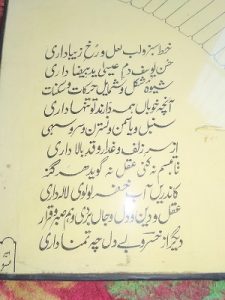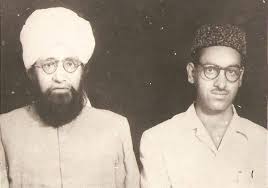Peace Watch » Editor's Take, Kashmir-Talk » When Grandmothers and Mothers Glued Their Ears To Radio Trarkhal
When Grandmothers and Mothers Glued Their Ears To Radio Trarkhal
Nostalgia
Our Love for Radio Trarkhal.
ZGM
 Sitting in the window of his workplace with lenses as thick as magnifying glasses in steel frame tied to his ears with thick cotton threads, he weaved dreams on Pashmina Shawls with a needle and silken threads. Moving his needle with precision as swiftly as wings of a hummingbird, and often looking into a neighbor’s vast pomegranate garden in full bloom he sounded like reciting Rumi’s poetry, “Come to the orchard in spring. There are light and wine, and sweethearts in the pomegranate flowers.”
Sitting in the window of his workplace with lenses as thick as magnifying glasses in steel frame tied to his ears with thick cotton threads, he weaved dreams on Pashmina Shawls with a needle and silken threads. Moving his needle with precision as swiftly as wings of a hummingbird, and often looking into a neighbor’s vast pomegranate garden in full bloom he sounded like reciting Rumi’s poetry, “Come to the orchard in spring. There are light and wine, and sweethearts in the pomegranate flowers.” I don’t know if he had a working knowledge of Persian language and had read any Persian poetry and naats or like the majority of people in the city founded by the Sultans he had heard naats in Khanqahs and Masjids and remembered them by heart. He often hummed a famous naat of Amir Khusroo. Many other elders in our Mohalla remembered this naat by heart. They often said this naat was most popular with Yousuf Sahib and till his exile in 1947 it resounded in the Jamia Masjid.
I don’t know if he had a working knowledge of Persian language and had read any Persian poetry and naats or like the majority of people in the city founded by the Sultans he had heard naats in Khanqahs and Masjids and remembered them by heart. He often hummed a famous naat of Amir Khusroo. Many other elders in our Mohalla remembered this naat by heart. They often said this naat was most popular with Yousuf Sahib and till his exile in 1947 it resounded in the Jamia Masjid.
The great artisan, with deft hands, was the father of my classmate and friend Bashir. The pictures of a leader in ornate papier-mâché or carved walnut frames in his workplace cum drawing room like in many other houses mostly of working class made a statement about his political leanings and beliefs. The pictures on the walls loudly said he was not a supporter of the exiled leader of the Muslim Conference and religious scholar from Deoband but of the deposed and caged prime minister of the State. For lots of pictures of his leader on the walls, his workplace for me was no less than a photo gallery and museum. In one of the pictures, his leader was wearing a motely colored coat, a fez cap with a black tassel attached to the top adorning his head, and sporting black beard, in another picture, he wearing a Khadi Kurta-Pajama and sporting Bulganin beard and in yet another picture, bespectacled, bareheaded with receding hairline dressed in a perfectly tailored three-piece suit. On the wall shelves, it was two brass vases instead of flowers with real peacock feathers in them and small radio set adorned like a bride with crochet design covers. Interestingly, the radio set in the room always remained tuned to the Radio Azad Kashmir, Trarkhal. Those days, radio for most of the families was most prized possession and every care was taken for its upkeep. In our home, it had been kept in fully carved walnut wood almirah fitted with an inlaid lock to prevent children from damaging it. Like that of the needle-worker, our radio set in our home also remained tuned in to the Trarkhal radio station. Some time back in this column, I wrote about, why people were penalized for tuning in for listening to evening programs broadcast from this radio station and radios were chained and dragged to the police station. A couple of programs from the station cascading with piercing political satire on daily basis unnerved those strutting like monarch across the corridors of power- even the megalomaniac leaders after listening to these evening programs passed sleepless nights.
 Couple of days back on reading a news item about Molvi Muhammad Ahmed Sahib, having been admitted in a hospital at Rawalpindi, Pakistan, I was reminded of the days when not only our grandfathers and fathers but our grandmothers and mothers also glued their ears to the radio sets every morning for listening to Mirwaiz Molvi Mohammad Yousuf Shah’s Kashmiri translation of the Holy Quran from Trarkhal radio station. It was none but his son Molvi Mohammad Ahmed popularly known as Ama Lala who recited the verses from the holy book and read out the translation. He had such a magical voice that every syllable got etched permanently on the minds of the listeners. I remember having seen tears trickling down the eyes of the elders – even sobs filling the room when he presented the translation of the Quran. For his silky voice, he had endeared himself to people across the traditional political divide dating back to the mid-thirties of past century. His reciting verses from the holy and their translation in chaste Kashmiri language and made even the needleworker remorseful of the day when he and his father had been exiled. More than often father of my friend repeated the story of his exile: That Mirwaiz Yousuf Sahib had left in his car for meeting Quaid-e-Azam Mohammad Ali Jinnah in Lahore via the Jhelum Valley Road with his son Ahmed at the wheels. While Mirwaiz was still in Pakistan, the Maharaja externed him and prevented him from returning to Srinagar. His son Ahmed returned to Srinagar only to be bundled into the bus along with many another family by none but the lieutenant of the Chief Emergency Administrator – to live in exile. In our boyhood all our whole generation, for hearing him everyday morning perhaps after 7.30 A.M. news were very much familiar with his silky voice.
Couple of days back on reading a news item about Molvi Muhammad Ahmed Sahib, having been admitted in a hospital at Rawalpindi, Pakistan, I was reminded of the days when not only our grandfathers and fathers but our grandmothers and mothers also glued their ears to the radio sets every morning for listening to Mirwaiz Molvi Mohammad Yousuf Shah’s Kashmiri translation of the Holy Quran from Trarkhal radio station. It was none but his son Molvi Mohammad Ahmed popularly known as Ama Lala who recited the verses from the holy book and read out the translation. He had such a magical voice that every syllable got etched permanently on the minds of the listeners. I remember having seen tears trickling down the eyes of the elders – even sobs filling the room when he presented the translation of the Quran. For his silky voice, he had endeared himself to people across the traditional political divide dating back to the mid-thirties of past century. His reciting verses from the holy and their translation in chaste Kashmiri language and made even the needleworker remorseful of the day when he and his father had been exiled. More than often father of my friend repeated the story of his exile: That Mirwaiz Yousuf Sahib had left in his car for meeting Quaid-e-Azam Mohammad Ali Jinnah in Lahore via the Jhelum Valley Road with his son Ahmed at the wheels. While Mirwaiz was still in Pakistan, the Maharaja externed him and prevented him from returning to Srinagar. His son Ahmed returned to Srinagar only to be bundled into the bus along with many another family by none but the lieutenant of the Chief Emergency Administrator – to live in exile. In our boyhood all our whole generation, for hearing him everyday morning perhaps after 7.30 A.M. news were very much familiar with his silky voice.
Edited version appeared in Greater Kashmir on 28-1-2018
Filed under: Editor's Take, Kashmir-Talk







